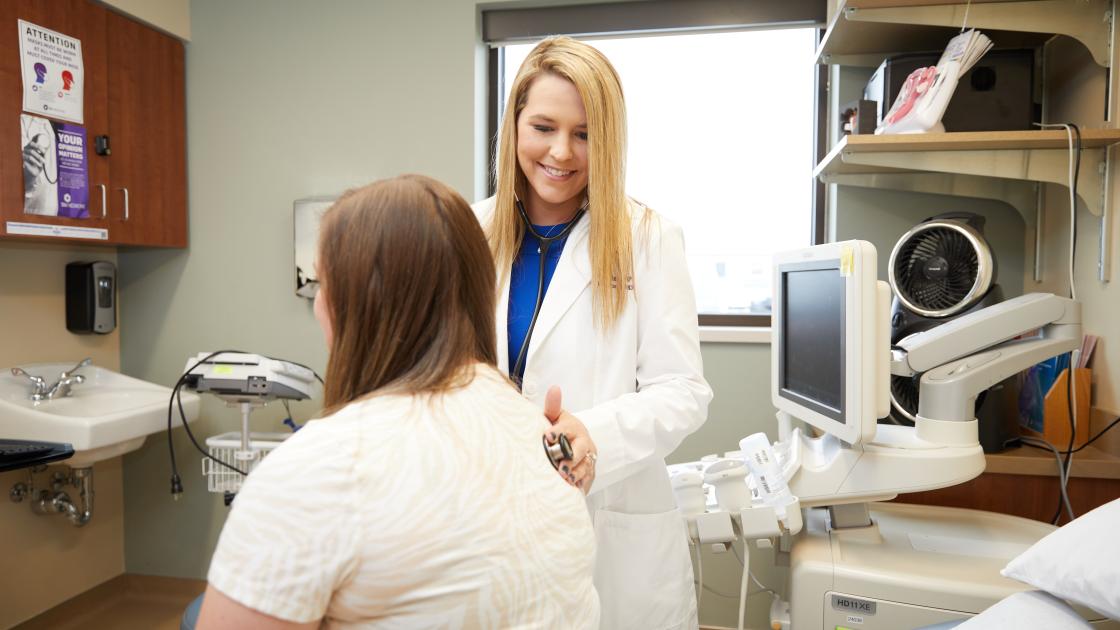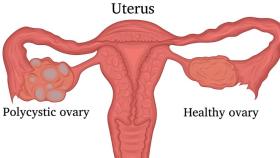
Understanding PCOS: signs, causes and treatment
Polycystic ovarian syndrome, or PCOS for short, is the leading cause of female infertility, according to the World Health Organization. This condition affects a surprising number of women of childbearing age—about 1 in 10. Even more alarming, up to 70% of affected women are undiagnosed, and the condition can lead to significant health issues such as type 3 diabetes, obesity, cardiovascular disease and endometrial cancer.
At SIU Medicine, our women's health team offers a variety of insightful and effective treatments and services to help women struggling with PCOS feel more in control of their reproductive health and family planning.

What is PCOS?
No single test can diagnose PCOS. Instead, doctors use a variety of tests and measures to rule out other conditions and confirm a diagnosis. PCOS is an endocrine disorder, although it can also impact metabolism, reproduction and other body systems. It's believed to be caused by hormonal imbalances in a woman's body. Hormones at play may include:
- Estrogen and progesterone, made by the ovary
- Luteinizing hormone, made by the pituitary gland
- Insulin, made by the pancreas
- Testosterone, made by the ovaries and adrenal glands
If these and other hormones in a woman's body become imbalanced, PCOS can develop. It can cause a woman's menstrual cycle to become abnormal and prevent an egg from developing or releasing properly during ovulation.
Who gets PCOS?
Any woman who has gone through puberty can develop PCOS, no matter what her age. It's not always clear what causes PCOS or why it happens, but research indicates certain women are at a greater risk of developing the condition if they:
- Are obese
- Have diabetes
- Have a family history of PCOS
What are common PCOS symptoms?
PCOS affects women of reproductive age, beginning in adolescence, but symptoms can vary over time. The most common ones include:
- Hirsutism (excessive hair growth in areas where men typically grow hair, including the upper lip, chin, chest, abdomen and back)
- Hair loss on the scalp
- Skin darkening/hyperpigmentation (often around the groin, in the creases of the neck, and beneath the breasts)
- Moderate to severe acne
- Skin tags (especially around the neck and armpits)
- Irregular menstruation cycles (e.g., unusually long or sporadically missing periods or no periods)
- On ultrasound imaging, the ovaries may be enlarged and have multiple cysts (where PCOS got its name)
- Infertility
- Obesity
- Depression
- Lowered sex drive
- Abnormal lab tests (including elevated levels of certain hormones called androgens)
Women with PCOS also appear more likely to be diagnosed with other health conditions, including sleep apnea, high blood pressure, high cholesterol, heart disease and endometrial cancer. While there is no cure for PCOS, symptoms and associated conditions can be managed. Seeking proper medical care as soon as you notice any signs and symptoms of PCOS is important! It could save you or your loved one's life.
Can I get pregnant if I have PCOS?
Women with PCOS can get pregnant, though it may be more difficult. Having PCOS also increases the risk of complications like miscarriage, preeclampsia, gestational diabetes, cesarean delivery and macrosomia (unusually large baby). Working closely with an OB-GYN is important for expecting moms who have PCOS.
The SIU Fertility and IVF Center physicians are board-certified in obstetrics and gynecology, reproductive endocrinology and infertility, and urology. In addition, the physicians and their team of specialty nurses, genetics counselors and dietitians provide the most advanced treatment options and personalized attention. Our clinic is unique because we use a team approach for female and male patients in their fertility journey.
How does SIU Medicine treat PCOS?
The best treatment for PCOS is one that is individualized to meet the specific goals and needs of those diagnosed with the condition. Certain factors may affect a woman's plan of care, including whether she wants to have children. Common treatment options include:
- Medications to alleviate symptoms, restore hormonal balance (e.g., hormonal birth control) and improve blood sugar levels and other related issues
- Lifestyle modifications (exercise, diet, stress management, smoking cessation, etc.) to improve overall health, help manage symptoms, promote a healthy weight and avoid long-term health complications
Are you concerned about PCOS signs and symptoms?
Find compassionate care and the right treatment for you from a medical team you trust. Our OB-GYN team is ready to advocate for your health. Call SIU Medicine today at 217-545-8000 to schedule an appointment with a women's health specialist to better your reproductive health.




